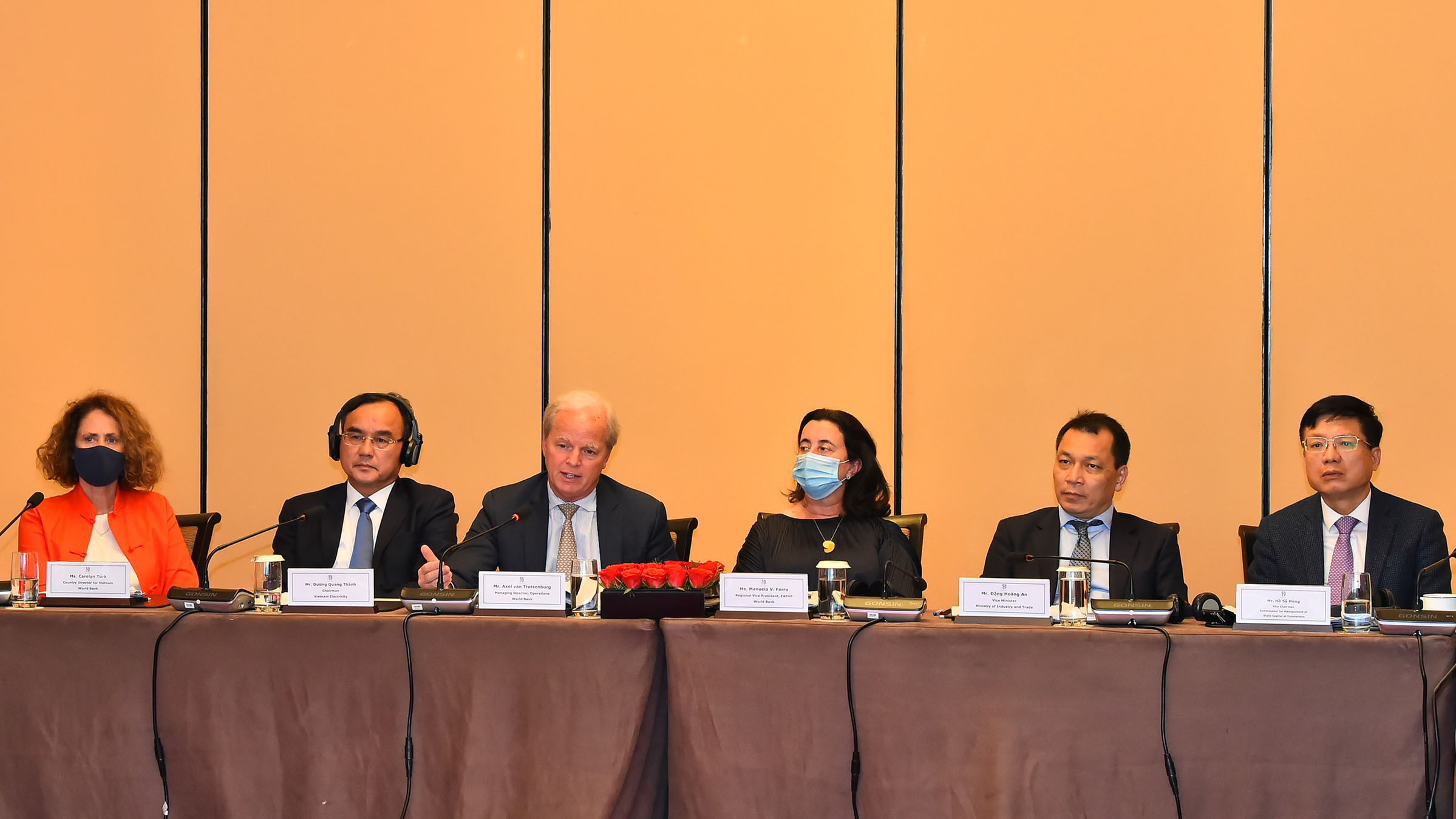Recently, in Hanoi, EVN's Chairman of the Member Board - Mr. Duong Quang Thanh, participated in the seminar "Vietnam's energy transition: Challenges and Opportunities" organized by the World Bank, together with representatives of the World Bank's leaders, representatives of the Central Economic Commission, the National Assembly's Science, Technology and Environment Committee, the Ministry of Industry and Trade, Ministry of Finance, Ministry of Planning and Investment, Ministry of Natural Resources & Environment, Government Office, Commission for Management of State Capital at Enterprises.
Orientation of EVN
Based on the development perspective of the Draft Power Master Plan VIII, EVN has identified a number of focal points to develop strategic orientations for the energy transition.
Specifically, in respect of power sources, EVN will optimize and choose the appropriate ratio for different types of power sources; develop thermal power plants using liquefied natural gas and renewable energy sources; focus on researching and updating technologies to apply new fuel sources with low greenhouse gas emissions. EVN has also determined a roadmap to upgrade and apply technological solutions to store and treat greenhouse gas emissions for traditional thermal power plants; laid out a roadmap to phase out old plants no longer meeting age limits and emission standards.

Chairman of EVN's Member Board - Mr. Duong Quang Thanh (second from left) at the seminar "Energy transition: Opportunities and challenges", organized by the World Bank on July 18 in Hanoi
With the power grid, EVN focuses on developing the transmission grid system to release capacity synchronously with the power investment roadmap to 2045; study and apply technological solutions, modernize and improve the capacity of the transmission system, reduce the loss rate on the transmission and distribution grid; develop smart grids, combined with building an ancillary service market for power sources and loads, in order to improve the flexibility of grid operation.
At the same time, EVN shall promote the mobilization of preferential capital sources at home and abroad to invest in the development of renewable energy, new energy sources and encourage energy transition.
Identifying challenges
Currently, thermal power sources play an important role in meeting Vietnam's power demand. This type of power source is proactive in terms of fuel and supplies and equipment, operating stably, with an equivalent number of operating hours up to about 7,000 hours/year. In the context that the annual load growth rate in Vietnam is still high. If the development of new coal-fired power sources is not performed (except for ongoing projects) when there are no alternative energy sources, it will lead to the risk of not meeting supply source demand, directly affecting national energy security. This will also greatly affect the operation, production and business efficiency of EVN and the units owning coal-fired power plants.
In terms of technology, power plants using new energy (hydrogen, ammonia) are still in the research stage and have not been widely commercialized. Therefore, when implementing the development of such plants in Vietnam, the Sector may face problems. For imported LNG, the cost of power generation is quite high compared to other types of sources.
The biggest challenge for EVN when performing energy transition is the large investment costs while ensuring the balance in electricity prices with affordability and approval by the Government. According to calculations, in the period 2025-2030, each year EVN needs to mobilize up to USD 6 billion in investment capital for power source and grid projects in the very limited condition of access to concessional loans.
First steps
To implement the energy transition program, EVN has made a number of proposals for implementation such as: Supplementing the planning and implementation of offshore wind power investment in the Northern region to enhance the power supply in the Northern region and at the same time ensure national security and reduce greenhouse gas emissions; Supplementing the planning and implementation of solar power investment on the reservoir-bed of hydropower plants of EVN and its affiliated units to take advantage of the available ground and power transmission infrastructure and coordinate optimal operation with hydropower plants; Studying and proposing investment in storage sources and hydroelectric power plants for the optimal and safe operation of the system when the proportion of renewable energy sources increases; Investing in power grid projects according to the approved planning in order to strengthen and consolidate the infrastructure of the power transmission system.
Currently, EVN is implementing the project "Vietnam Renewable Energy Accelerating Change - REACH" with a loan financed from the World Bank and the Canada Fund, worth USD 202 million. EVN is also recommending that the Government and ministries request the WB to continue providing preferential loans for power projects in the period of 2025-2035 with a total value of about USD 2 billion; provide technical support in building an energy transition strategy with roadmap studies, analysis, calculation and evaluation of each specific activity, and so on.
evn.com.vn
Share